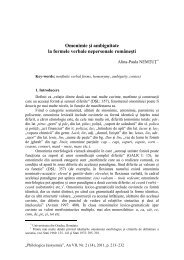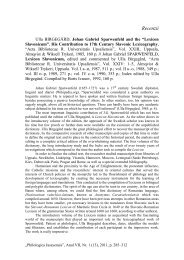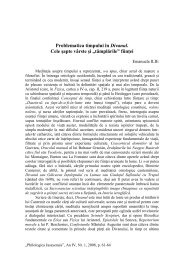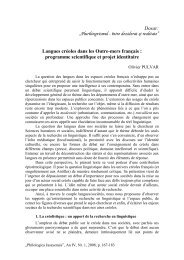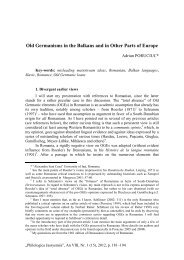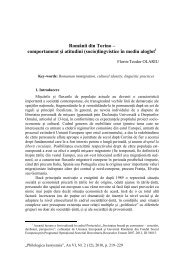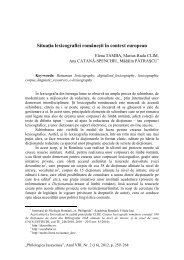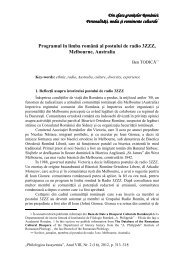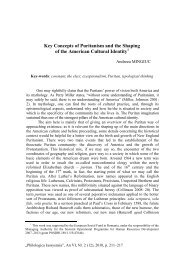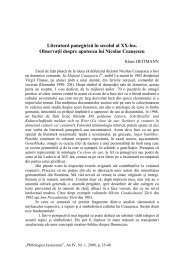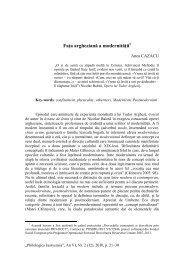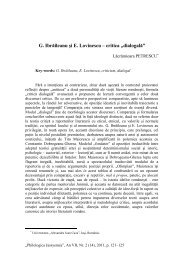Articol despre Stierle - Philologica Jassyensia
Articol despre Stierle - Philologica Jassyensia
Articol despre Stierle - Philologica Jassyensia
Create successful ePaper yourself
Turn your PDF publications into a flip-book with our unique Google optimized e-Paper software.
Mihaela ALBU<br />
manner, and less as a practitioner. “Down in the plain of the Danube”, at least “a<br />
few years before the Second World War”, the time when the Moromete family is<br />
seen as a model of a Romanian peasant family, “time seems to have been very good<br />
for the peasantry; life went on there without too much trouble” (Preda 1957: 7). It<br />
was a life of a family in the Baragan, and Moromete, the father and the prototype of<br />
the peasant from the plain, who has his own philosophy over life, is seen from the<br />
very beginning of the story “seated on the rail of the plank-bridge” and “looking<br />
across the bridge. He just sat there, at a loose end, looking at nothing in particular.”<br />
Even “the smoke of the cigarette in his hand was rising straight up, without haste or<br />
purpose” (Preda 1957: 8).<br />
No “haste or purpose” appeared to characterize the whole life in Baragan. The<br />
people of the large spaces seemed to borrow from the plain the special feeling of<br />
vastness and eternity. “If you are armed against these two twin ailments of the flesh”<br />
(thirsty and hunger), wrote Panait Istrati, “and if you wish to walk alone with your<br />
God, go out to Baragan; it is precisely the place the Creator allotted to Wallachia for<br />
the Romanian to dream away at this leisure” (Istrati 1930: 11). The former<br />
inhabitant of the plain stressed out the special feature of the “Baragan-man”, his<br />
tendency to dream and to contemplate the world. “There are places in the world<br />
destined for contemplation” (Istrati 1930: 11). The man who dwells on the Baragan<br />
has “a rather grave character. […] Dreams, meditation, aspiration and a hollow belly<br />
are what give man gravity” (Istrati 1930: 12). The people “prefer to listen<br />
differentially. That is because their lives are hard and because they live in the hope<br />
that someone may appear to teach them what to do so as to wrest the best possible<br />
advantages from their steppes” (Istrati 1930: 12).<br />
Conclusion<br />
For many Romanian writers the Baragan plain has always been geography<br />
beyond real, or rather a utopia and a myth.<br />
The Baragan has a millenary existence, and the people who live there know<br />
that it is sometimes “lazy and disobedient” and they have the feeling that “life takes<br />
its form from sleepiness and gets its continuity from mirage” (Istrati 1930: 133).<br />
This “mirage” is – in a metaphorical way – the endless dream of “walking the line”,<br />
of crossing the “borders” toward the civilization, toward the city where its<br />
inhabitants “have some bread to eat”.<br />
In Lucian Blaga’s opinion,<br />
Romania’s lowlands are imbued with longing for the high mountains<br />
meadows. The people from the fields do not have such meadows, so their soul and<br />
mind made up for its atmosphere – through their songs (Blaga 1999: 56).<br />
Can we find “the longing for the high mountains meadows” in the novels<br />
where the characters live in the Romanian plain? I cannot find it, at least in the<br />
authors cited above. Can we depict the same kind of “Mioritic’s sense of destiny” in<br />
the folklore of the population who live in the plain? It is a topic that can be studied<br />
with another occasion. Now, let’s go back to the Romanian writers who saw man<br />
living his destiny as an inhabitant of the boundless space of the field. This field, like<br />
the ocean, gives him a different perspective. The writers described this territory and<br />
14



